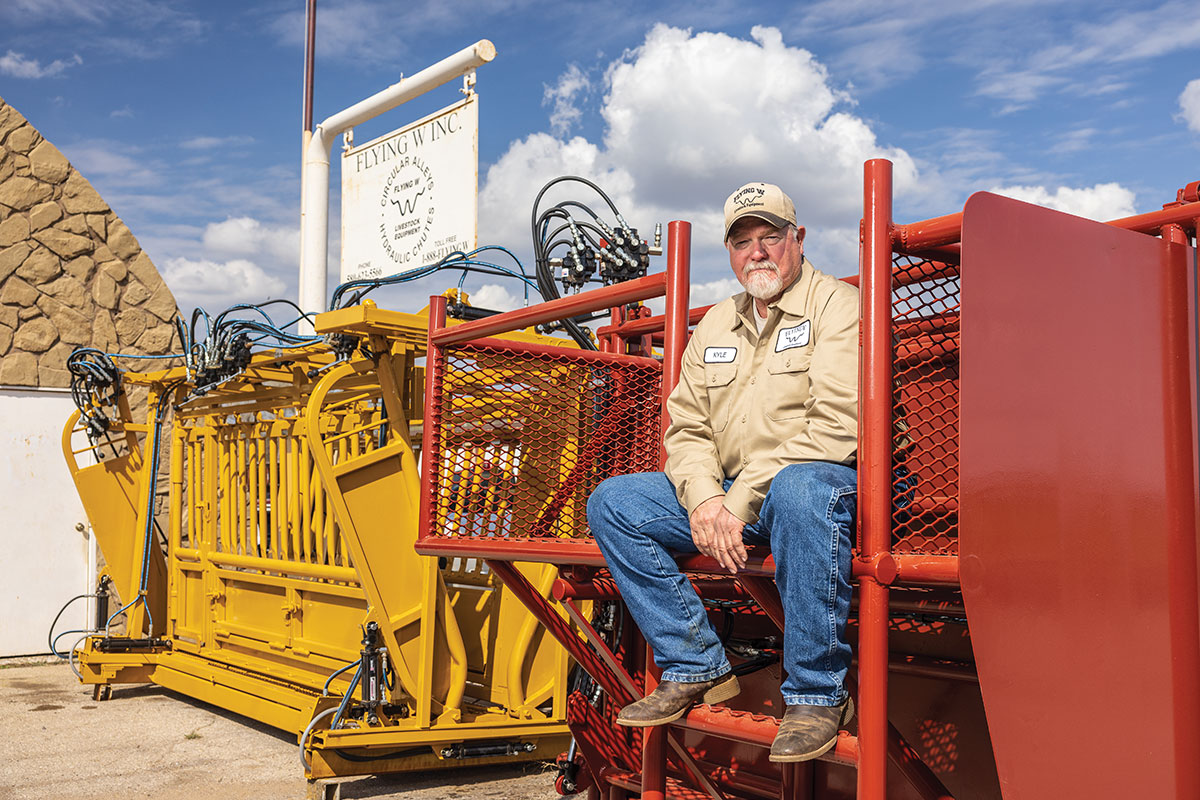The Widney family continues a tradition of building livestock handling equipment that keeps animals and agricultural producers alike safe and efficient.
Vibrant yellow livestock chutes draw drivers’ attention from the road ahead as the Flying W sign waves back and forth above them on the west side of Watonga along Highway 270. The outside of the Flying W Livestock Equipment headquarters provides just a glimpse of the history and passion that lies within.
“My dad always wanted an alleyway,” said Kyle Widney, owner of Flying W Livestock Equipment and Blaine County Farm Bureau member. “So he went and got some new steel and went into the shop and built the alley.”
That little cattle handling alleyway that Widney’s father built was the first of many to come, and it was just the beginning of Flying W Livestock Equipment.
Once Widney’s father finished building his first livestock alleyway, a neighbor liked it, so he built him one, and then another, and another, and it kept going, Widney said.
“That yellow alleyway was here before me and was the very first one,” Widney said. “I don’t run any livestock through it anymore, but it’ll stay there long after I’m gone.”
Flying W Livestock Equipment is a family-owned and operated business in Watonga. The Widneys are celebrating 43 years in business this year with no sign of slowing down.
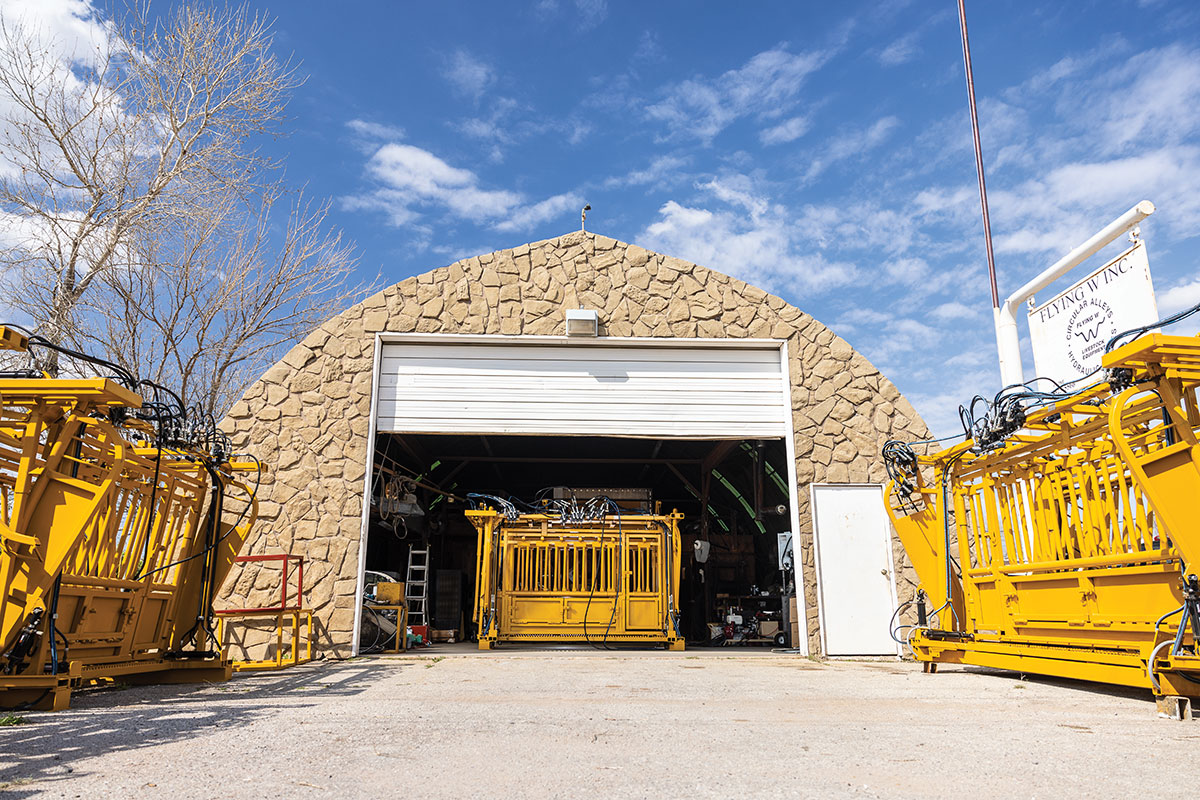
Beginning in the late 70s, Widney’s parents, Wilford and Darlene, started Flying W to supplement their farm income. In 1982, they officially started the business to provide their customers with high-quality livestock handling equipment to enhance their farms, ranches and agricultural operations.
Widney attributes some of his business success to growing up on a farm and gaining knowledge from working cattle himself. The family still runs a cow-calf operation and raises wheat on about 800 acres of their family farm, passed down from his grandfather. Being raised on a farm has help to strengthen Widney’s knowledge of what works when handling livestock and how to deal with cattle.
As he has worked with cattle on his family’s farm throughout the years, he has gained
first-hand insight about what other farmers and ranchers might need in their livestock handling equipment while passing on some knowledge experience learned through experience to his employees.
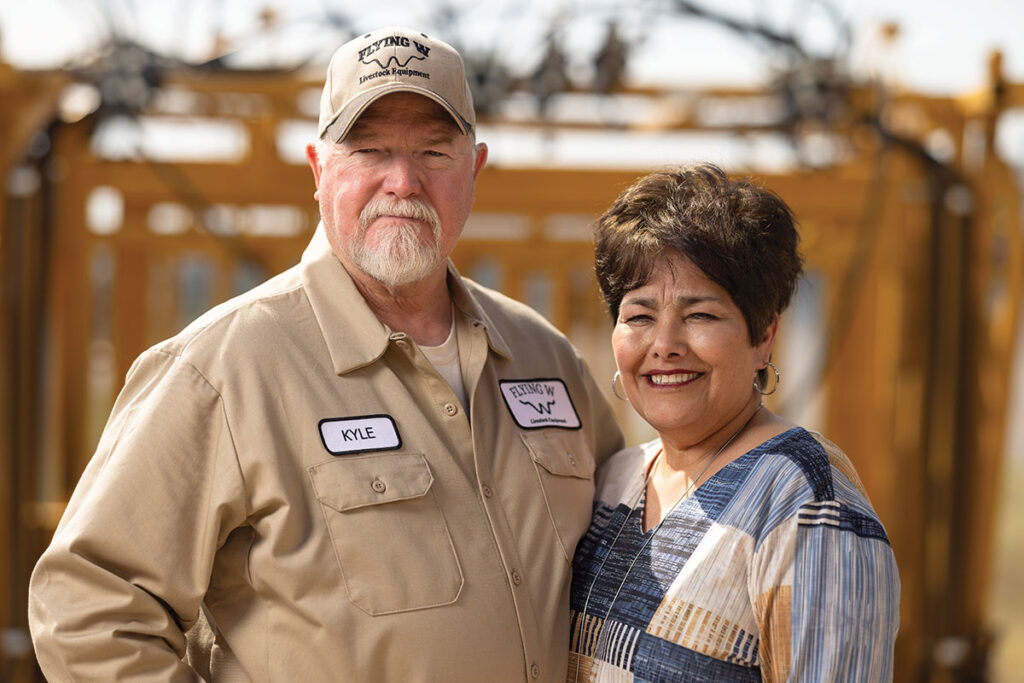
Today, Widney works alongside his wife, Laura, a son-in-law and several dedicated employees who work together to handle everything from working with customers to building the livestock equipment to delivering it far and wide.
“When my dad started the business, he had some veterinary friends he visited with and used their ideas, and came up with the chute we have today,” Widney said. “I’ve made a few tweaks here and there, but pretty much it’s the same thing that he had going back in the day.”
The family has stayed true to emphasizing safety for both livestock and people in all their equipment. It is important to not only keep the animals safe, but also the worker guiding them through the chute as well. That is why Widney said the Flying W hydraulic chutes are built as heavy and as safe as they can be.
“When you are working with something as dangerous as cattle, you want to know it won’t fall apart,” Widney said of his livestock chutes. “We do the best we can to make a quality product.”
One safety feature that is special to Flying W chutes is a hydraulically-operated featured called a “headbender,” for which Wilford Widney received a U.S. patent. The hydraulic “headbender” safely moves the animal’s head to the side so livestock handlers do not have to contend with the animal’s head swinging back and forth. This not only protects the person operating the chute and workers tending to the animal, but also the livestock.
Another hydraulic feature the Widney family engineered holds the animal’s head in place from the top as well a from the sides. Widney said that these two features work well together to help reduce the animal’s head movement and increase safety for all parties.
“That’s safety for you and the animal,” Widney said of the features. “You don’t want the animal whipping its head and hurting itself or hitting you up in front.”
When it comes to the construction of the chutes, four to five Flying W employees work to fabricate each chute while two more workers assemble the chutes.
Each person has a specific function as they construct and assemble the chutes. One person might oversee building the side panels, while another puts together the chute floors. Once all the pieces are welded and prepared, they bring them all together to build a functional chute. After assembly, each chute gets moved into the paint shop and afterwards transitions to the hydraulic shop where all necessary hoses, manifolds and controls are added.
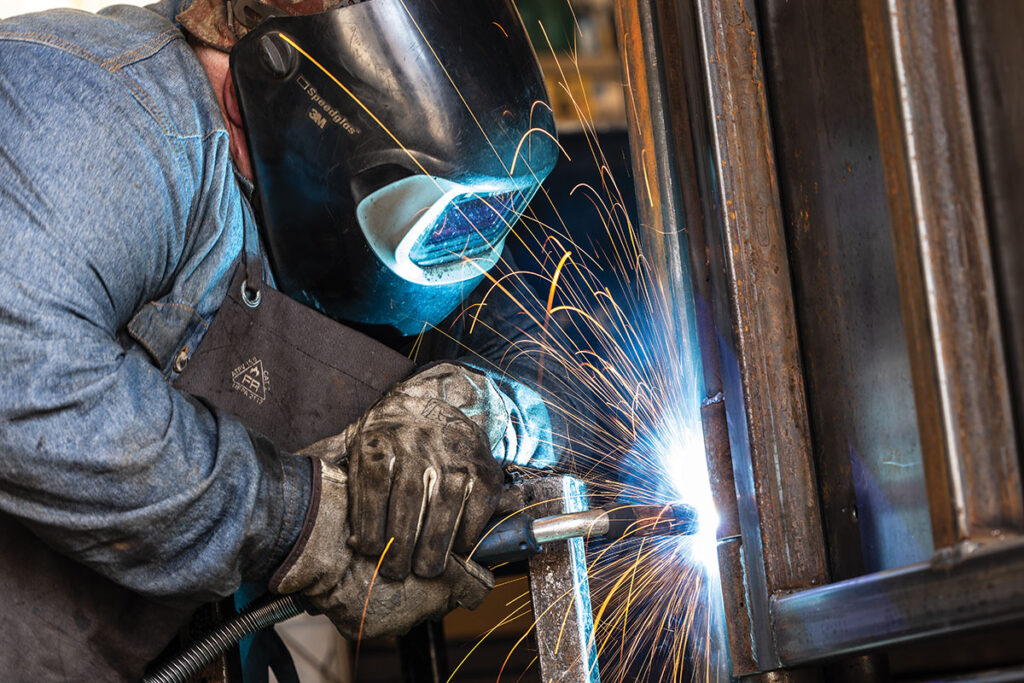
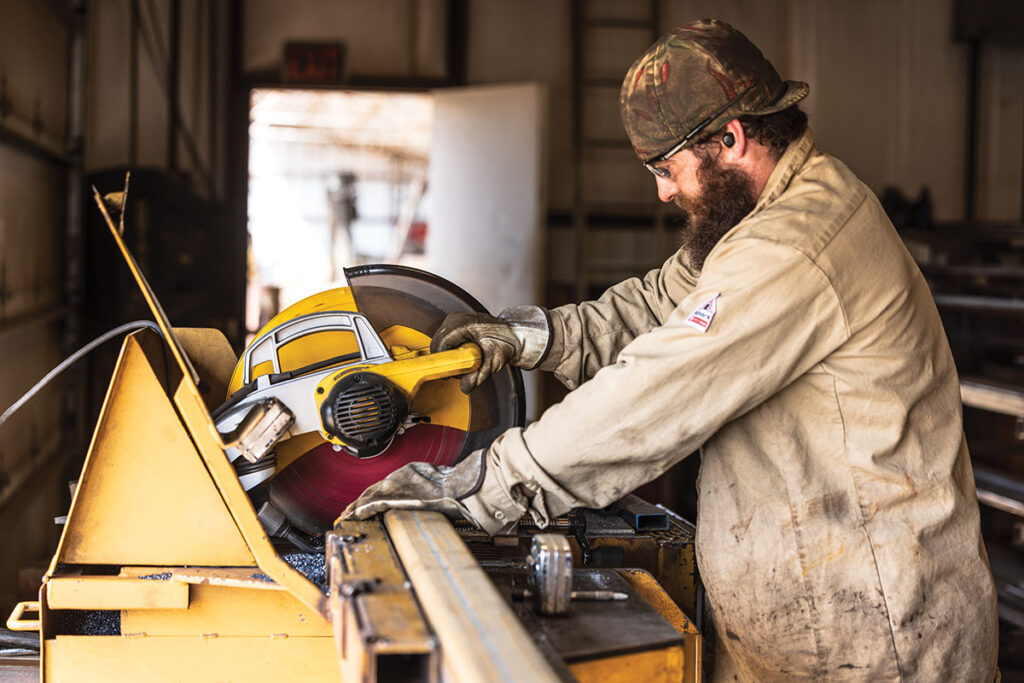
Widney said it takes between one and 1 1/2 weeks for a standard chute, tilt chute or big chute to progress from raw metal to assembly. Regular chutes can be built in as little as a week if everybody is on the same page and working steadily.
“Now, that is just getting it built out,” Widney said. “You still need to put hoses on, paint it, put everything on it and make sure that everything’s good. By the end of the whole construction process it ends up taking about two to three weeks.”
When it comes to chute designs, Flying W offers a multitude of options that can be customized for each customer, each of which is designed to accommodate the needs of a unique user. Widney said it comes down to being able to look at someone’s operation and see what they need to craft a final product that fits their requirements.
“We let the customer tell us what they want,” Widney said. “We don’t build just one chute and say, ‘Here’s what we got.’ We custom build our alleys, our chutes — everything.”
While Flying W is a well-known name brand amongst Oklahoma agricultural producers, they have also earned a nationwide reputation for their quality chutes.
Flying W has sold and shipped equipment to numerous farms, ranches and facilities from Florida to California and from Canada to Hawaii — even to Australia. Widney said the company has recently shipped several horse chutes to Oregon, Washington and Canada to be used by wild horse and donkey sanctuaries.
The company’s reach does not end at donkeys and horses, however. Widney said Flying W also offers chutes for bison and has even begun offering their own customized bucking chutes for rodeo stock. No matter the livestock, Widney said Flying W is prepared to make a chute to keep both livestock and workers safe and protected.
Widney said they can even provide specialized features for chutes that cater to universities and veterinarian clinics, such as head- and tail-gate guards. He said the feature is helpful for teaching purposes while also adding an extra level of safety.
A handful of universities currently use Flying W hydraulic chutes, including schools in Colorado, Kansas, Louisiana, Alabama, Texas and several other states. Widney said that having the chutes in universities is one of the best advertisements they could have.
“As students learn at vet schools by using our equipment, when they get out and have their own facilities and get going, they’ll be used to using our equipment.” Widney said.
Widney and numerous Flying W customers will tell you that because of their quality and features, the chutes sell themselves. Widney said that the word-of-mouth reputation
earned by building decades’ worth of quality chutes means the family does not advertise
or market their products. Many customers will recommend the product time and time again and are loyal customers. Widney said that for the most part, customers’ only regrets tend to be not investing in one of Flying W’s chutes sooner.
“I love this business,” Widney said. “I love the people, and so many of the people we deal with are good country folk. It’s awesome to have someone see my cap and say, ‘Man you’re the person who built my chute I bought 20 years ago, and it’s still awesome.’”
From horses to cattle, from coast to coast and with multiple hydraulic equipment design options, Flying W has a chute for everyone. The family’s values run deep and the passion for the business is embedded in each and every product that leaves the Widney family’s shop.
“Daddy always said that this is the good Lord’s business,” Widney said. “We’re just keeping it running.”
